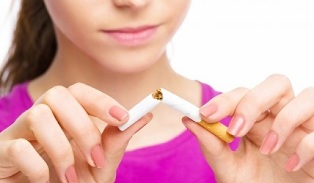
In the process of giving up bad habits, the main thing is not to go overboard with setting goals and updating goals. Very few are able to quit smoking here once and for all. It is a long-term process with its own failures and experience. All this is related to emotional, psychological and physiological characteristics. You can quit smoking on your own, but you have to do it right, sensibly, gradually.
Let's try to understand all the twists and turns in this important but not easy question. Experts have developed a formula for success for a person who gives up addiction, in the form of a calendar or graph with a detailed description of the changes that occur in the body. I wonder what happens to the body when you quit smoking. Let's try to understand it.
Important: the effects on the body during the day
During the transition to a healthy lifestyle, significant clinical changes occur in the body of an adult (heavy smoker), the emotional background and physiological state change. Each new day of smoking cessation differs from the previous one against the background of psychological problems and physical well-being. As the saying goes, the main thing at this point is not to break. So, we will present a picture of what is happening in the form of a diary, which marks a certain number of calendar days and gives a description of the current symptoms.
Smoking Cessation: Day One
When the decision to quit smoking has finally been made definitively and irrevocably (though not for the first time), it is necessary to "enter" this process gradually. To facilitate the transition from an unhealthy lifestyle to a healthy one, it is important to know how the body will behave. On the first day of the "course" of a healthy lifestyle, the weakened body must get used to a new regime for itself and begin the recovery process. The sudden transition from one state to another can adversely affect overall well-being and reduce determination. This is not only a physical but also a psychological test.
The main thing that happens to the body when you quit smoking: the amount of carbon monoxide decreases, the transport of erythrocytes improves and more oxygen enters the tissues. Even outwardly, on the first day after quitting nicotine, the "former" smoker enjoys a new state for himself, he is more active, cheerful, confident in their own strength. The very ability to painlessly give up the habit of smoking on the first day of the course convinces the sworn smoker of determination and will. This is important for overcoming the craving for nicotine.
Remember, however, that on the first day, characteristic physiological changes begin in the body.
For example, what happens in a woman's body:
- slight dizziness,
- lack of appetite,
- weakness,
- anxiety,
- sleep disorders,
- insomnia.

What is the reason? An experienced smoker tests his body on an emotional, psychological and physiological level. Such deep processes are triggered that the body "cannot live" without nicotine.
Quitting smoking causes other dramatic changes. Nicotine is not just absorbed into the bloodstream, but begins to affect blood flow. It is therefore important to keep in mind that the body will generally need at least a year to recover from quitting smoking. But for now, go back to the smoking cessation diary.
Remember that on the first day of quitting smoking, characteristic physiological changes begin in the body, for example, women experience mild dizziness.
Smoking Cessation: Day Two
At this time, determination can be a little misleading - attacks will begin to return to the old habit (at least not for long). This happens, for example, in a man's body. While the struggle takes place on an emotional level, the body undergoes no less dramatic changes: the respiratory organs are released from mucus and precipitated components, the functions of the ciliated epithelium are restored, the state of the gastrointestinal tract appears in the tissues. The changes that occur during this period on an emotional level manifest themselves in the form of euphoria, emotional excitability. But irritability can also occur. It all depends on self-hypnosis and self-discipline. Although sometimes drowsiness can be abruptly replaced by energy. On the second day after quitting smoking, the appetite is still not fully restored (strange taste sensations may occur). You may also experience shortness of breath, cough, or even stomach pain. During this period, urges to urinate and difficulty falling asleep are more common. If you add to this nervous tension, for example as a result of stress at work, then it is quite natural to itch the skin.
Smoking cessation: third and fourth day
Let's take a closer look at what happens to the body when you quit smoking. A set of factors affects how soon the body will recover. In particular, general condition and weakened immunity play a special role. Therefore, the nuances of smoking cessation therapy must be assessed at the cellular level. Everyone has their own supply of inner energy to fight addiction. Accordingly, an individual approach is needed. In the process of cleansing the body gets rid of toxins. Even the structure of the cells changes to cause radical cleansing.
Here's what happens to the body these days:
- restoration of ciliated epithelium on respiratory tissues,
- in the pancreas the alkaline fraction indicator increases,
- less mucus accumulates in the stomach,
- In general, blood circulation in the heart and brain improves.
There is a clear reluctance to smoke, peristalsis normalizes. At the same time, the "withdrawal" of the former smoker intensifies, which has more psychological consequences, nervousness appears. Quitting smoking seems to "find no place for itself", fighting a long-term habit. Against this background, there is an increased appetite, "seizure" of sweets. Sometimes the skin begins to peel off and the fingers swell. When coughing, sputum may appear in the throat.
Smoking Cessation: Day Five and Six
In the process of "quitting" smoking, many people use a special table or calendar for convenience, someone keeps a diary, writing down their feelings in detail. This is useful when you need to identify related symptoms and changes in the body. As it becomes easier after a few days, the diary will help you to restrain yourself and analyze your mistakes. From the fifth to the seventh day, a former smoker notices the following changes in his body: it is noticeable how the microtraumas on the skin began to heal faster; all segments of the respiratory system are restored (and the most distant as well); digestion is normalized; at an invisible level, blood cells are cleared of nicotine.

Usually the last point in the process of combating addiction is placed on the seventh day, when a person's physical addiction to cigarettes (smoke, smell) disappears. At the same time there is no feeling of psychological discomfort. But do not forget about the likelihood of recurrence. Interruptions do happen. When the euphoria passes, nervousness and aggression appear. Even sleep problems can recur. However, it is important to remember that it is not for long that the main stage in life - quitting smoking - is completed successfully and there is no motivation to return to the old life.
In the process of "quitting" smoking, many people use a special table or calendar for convenience, someone keeps a diary, writing down their feelings in detail.
Smoking cessation: Second week
After a week, it seems that the Rubicon has been adopted and now you can live as a non-smoker, take care of daily worries. But this rarely happens. The body certainly made a big leap in the first week of quitting smoking. Nevertheless, sometimes even external factors (cigarette smoke and even their appearance, for example when smoking nearby) can play a bad joke with an ex-smoker. That's why it's worth sharing your plans with friends and acquaintances so that you are not tempted to break away "for the company".
It's worth listening to your body at this point, you've probably already managed to wean yourself off nicotine. But the process of recovery from nicotine addiction is not over. You can help yourself by flipping through an ex-smoker's calendar to see obvious changes in your work. It turns out that from the second week the struggle becomes a purely psychological plane. The desire to smoke can arise during stress, sadness, at the sight of an active smoker at work. One must learn not to react to such external promises of going back in time.
What happens at the end of the second week?
It's been 14 days since a former smoker abstained from nicotine addiction. At this time, the following changes in his body can be noted: the healing of bronchitis and the renewal of platelets. Although red blood cell renewal has not yet occurred. This may be due to vegetative-vascular manifestations. At the same time you can see how the complexion improves, the yellowish tint of the fingers disappears and the sharp cough gradually disappears. The longer the smoker experiences, the longer the symptoms will appear.
What happens in the first month of quitting?
On the 30th day of smoking cessation, the weight begins to decrease, the upper respiratory system is fully restored and psychological comfort is felt. At the same time, enthusiasm can be replaced by depression or blues. Here again, as in the first week, it is important not to relax, to stay, because the most difficult way to quit smoking has already passed.
What happens from the second month of quitting smoking?
Starting from the second month of the nicotine recovery process and the next three to four months, the ex-smoker (this is especially noticeable in women) acquires more pleasant facial features, puffiness subsides and the grayish complexion disappears, andcouperose networks. And in the third month in the body there is an intensive recovery of blood vessels. This indicates that the body's tone is finally normalizing, and also that the "point of no return" has finally passed. The physical thirst for tobacco has weakened so much that one can easily accept another smoker next to him without suffering. Overall, there are noticeable improvements on an emotional, psychological and physical level. Good appetite is no longer a sign of a fit of stress, but is simply associated with well-being.
What happens in the first year after quitting?
Now let's look at what happens to the body when you quit smoking in the long run. Six months is an important stage. At this stage of life, doctors note the complete renewal of all body systems, when the blood and cells are almost completely free of the toxic substance (nicotine). It seems that every new day it becomes easier to breathe. The lungs really work more efficiently. One year is already a real experience of an ex-smoker. This is the period when the first serious results can be summarized. For example, you can congratulate yourself on the successful end of the event and just enjoy a life without nicotine, which will surely bear fruit. Those who quit smoking reduce the risk of heart attack and stroke by 30-50 percent; lung cancer - by 80 percent; problems with the gastrointestinal tract - by 70 percent.
Willpower or alternatives
Many people who quit smoking have a false sense of how easy it is to achieve a goal by replacing one habit with another. But every psychoactive substance provokes a desire for other addictions. Someone switches to light cigarettes, someone continues to smoke a pack of cigarettes, just stretches it in time. Of course, smokers with twenty years of experience may find it harder than others. In this case, smoking cessation is cyclical, not abrupt. In any case, only a person can free himself by giving up only one habit.























